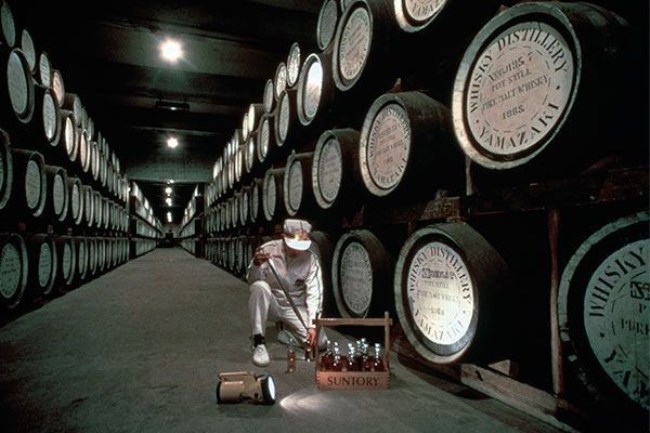A Japanese label is top in a prestigious whisky ranking, so what happened to the Scots?
When Jim Murray’s Whisky Bible 2015 finalists were announced in November last year, the world was shocked. Not only was the top label a Japanese whisky, none of the whiskies in the top five came from Scotland. In the 12-year history of Murray’s highly regarded whisky guide, neither had happened before.
The World Whisky of the Year turned out to be the Yamazaki Single Malt Sherry Cask 2013, on which Murray lavished much praise. In his book, he called it a drink of “near indescribable genius”, with a flavour that’s “thick, dry, as rounded as a snooker ball”, and a “nose of exquisite boldness and finish of light, teasing spice”. To the Scots, on the other hand, he let loose a torrent of disappointment, questioning where their innovation and depth went, as 2nd to 5th place went to American and English whiskies.
While it is perhaps a little unexpected that whisky’s spiritual home (or homes, if you count Ireland) couldn’t put out a winning product this round, we shouldn’t be at all amazed that Japan did.
Japanese whiskies, especially those by Suntory – the brewing and distilling company that owns Yamazaki, among many others – aren’t strangers to prestigious trophies. Suntory has been collecting them from the International Spirits Challenge every year since 2010. Even the Nikka distillery’s Yoichi 20 Year Old was voted Best Single Malt at the World Whiskies Awards 2008.
So what gives the prize-winning Sherry Cask such incredible flavour? Very simply, it’s Japan itself.
In addition to the use of Mizunara oak casks to add an oriental note to the whiskies, the very land it’s made on contributes to superb distilling conditions. “Yamazaki Distillery, nestled on the periphery of Kyoto, is in a misty region where the three rivers Katsura, Uji and Kizu meet,” says a Yamazaki representative. “The diversity in nature and temperature creates damp conditions ideal for ageing whisky.”
Of course, Scottish lands have their fair share of pure waters and rugged mountains, but Japan has another advantage. “The incredible variety of (weather conditions) in Japan is also another factor differentiating it from its Scottish counterparts,” he adds.
“The changes in temperature greatly affect cask ‘breathing’. This is the secret to producing the extraordinary flavour found within Suntory whiskies, distinguishing them from all others.”
With Yamazaki honoured, Suntory can sit back, while the whisky-drinking world fights for one of only 18,000 bottles produced.
Thanks to the bottle’s skyrocketing fame and score of 97.5 out of 100, all the stock in the Whisky Bible’s online store has been cleared. Because when Jim Murray says something is good, you’d better believe it.
The 57-year-old English writer and journalist is the world’s first dedicated whisky writer. He may in fact have visited more distilleries around the globe than anyone, considering his first visit was to the Talisker distillery way back in 1975. He believes so strongly in editorial integrity that the few publications that print his work have had to give him full copyright. Of course, those that want the full fount of his knowledge and opinion will no doubt have at least one edition of his ongoing project, the Whisky Bible.
While he does get help sourcing the various bottles from a team of researchers, the tastings and reviews are done solely by himself and judged based on nose, taste, finish and balance. The 2015 edition includes over a thousand new entries, with a total of approximately 4,500 whiskies.
However, all these reviews – regardless of how insightful and detailed – are still only one man’s opinion. He may have declared that Scottish distillers “have taken their eye off the ball and not brought into account the changes which have altered the face of whisky”, but it’s entirely possible that a man who has tasted as many whiskies as he has may appreciate something different over something he knows all too well. That being said, Murray has no lack of respect for Scotch, seeing as he gave the top spot to Glenmorangie’s Ealanta last year.
And perhaps the Scots understand that, because their response (or lack of one) has been largely impassive. “Whisky is increasing in global popularity and there is now greater interest in whiskies made outside of Scotland,” reasons Vinson Zhang, regional spokesman for Glenmorangie and Ardbeg. “We still achieved high scores in Murray’s Bible for Glenmorangie Lasanta and Dornoch, which scored 93 and 94 respectively, and demand for our brands remains prolific around the globe.”
It is admittedly fun to read reviews – especially scathing ones – when it comes to a product we love to indulge in, and wondering what the shamed participants may be muttering in their cold, dark cellars. But the greatest pleasure still lies in the glass, so leave behind all ratings and rants for a moment and just savour what nature, dedication and time have created and simply decide for ourselves.

